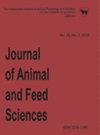添加精制二十二碳六烯酸对肥育猪生产性能、肉质和肠道微生物组的影响
IF 1.5
4区 农林科学
Q3 AGRICULTURE, DAIRY & ANIMAL SCIENCE
引用次数: 0
摘要
本研究考察了从鱼油中纯化的二十二碳六烯酸(DHA)对肥猪生长性能、营养物质消化率、粪便微生物计数、粪便评分和肉质的影响。将160头平均体重为70.51±2.23kg的杂交肥育猪[(约克郡×长白猪)×杜洛克]随机分配到4个日粮中的1个[每圈5头猪(2头公猪和3头母猪);每个处理8只]。饮食治疗为:CON–基础饮食,TRT1–CON+0.10%DHA,TRT2–CON+0.25%DHA,TRT3–CON+0.50%DHA。补充DHA使肥育猪的最终体重线性增加(P=0.046)。与CON组相比,TRT3组在第6周补充DHA增加了平均日增重(ADG)。此外,与CON组相比,TRT3组的增重饲料比(G:F)增加。增加日粮中DHA水平可线性改善ADG(P=0.046)和G:F(P=0.021)。补充DHA不影响营养物质的消化率。添加分级DHA水平对pH值、持水能力、烹饪损失和肉色没有影响。在第7天,与CON相比,TRT2和TRT3组的滴注损失减少。然而,粪便微生物和粪便评分测量在治疗中未受影响。简言之,添加DHA粉可以改善肥猪的生长性能,而不会影响营养物质的消化率、肠道微生物和粪便评分。本文章由计算机程序翻译,如有差异,请以英文原文为准。
Effect of purified docosahexaenoic acid supplementation
on production performance, meat quality,
and intestinal microbiome of finishing pigs
This study examined the effects of docosahexaenoic acid (DHA) purified from fish oil on the growth performance, nutrient digestibility, faecal microbial count, faecal score, and meat quality of finishing pigs. A total of 160 crossbred finishing pigs [(Yorkshire × Landrace) × Duroc] with an average body weight of 70.51 ± 2.23 kg were randomly assigned to 1 of 4 diets [5 pigs per pen (2 barrows and 3 gilts); 8 pens per treatment]. Dietary treatments were: CON – basal diet, TRT1 – CON + 0.10% DHA, TRT2 – CON + 0.25% DHA, TRT3 – CON + 0.50% DHA. DHA supplementation resulted in a linear increase ( P = 0.046) in final body weight of finishing pigs. DHA supplementation increased average daily gain (ADG) in the TRT3 group compared to the CON group at week 6. In addition, the gain to feed ratio (G:F) was increased in the TRT3 group compared to the CON group. Increasing dietary DHA levels linearly improved ADG ( P = 0.046) and G:F ( P = 0.021). DHA supplementation did not influence nutrient digestibility. The pH, water holding capacity, cooking loss, and meat colour were not affected by the supplementation with graded DHA levels. On day 7, drip loss was reduced in the TRT2 and TRT3 groups compared to CON. However, faecal microbial and faecal score measurements remained unaffected among the treatments. In short, powdered DHA supplementation improved growth performance in finishing pigs without affecting nutrient digestibility, intestinal microorganisms and faecal score.
求助全文
通过发布文献求助,成功后即可免费获取论文全文。
去求助
来源期刊

Journal of Animal and Feed Sciences
农林科学-奶制品与动物科学
CiteScore
2.10
自引率
0.00%
发文量
42
审稿时长
3 months
期刊介绍:
Journal of Animal and Feed Sciences (JAFS, J. Anim. Feed Sci.) has been published by the Kielanowski Institute of Animal Physiology and Nutrition, Polish Academy of Sciences in Jabłonna (Poland) since 1991. It is a continuation of the Polish-language journal Roczniki Nauk Rolniczych. Seria B, Zootechniczna published by the Polish Academy of Sciences since 1969.
JAFS is an international scientific journal published quarterly, about 40 papers per year including original papers, short communications and occasionally reviews. All papers are peer-reviewed and related to basic and applied researches in the field of animal breeding and genetics, physiology of nutrition, animal feeding, feed technology and food preservation. The journal distinguishes the multidisciplinary nature of physiological and nutritional sciences and so includes papers specialized in all fields connected with animal well-being, including molecular and cell biology and the emerging area of genetics.
 求助内容:
求助内容: 应助结果提醒方式:
应助结果提醒方式:


